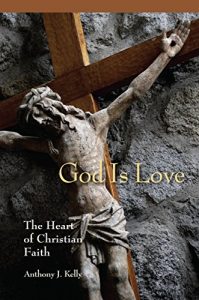God Is Love: The Heart of Christian Faith
 “It is God who defines what love originally and ultimately means,” Redemptorist Father Anthony J. Kelly says in “God Is Love.” The Australian theologian’s new book presents “a meditation on what it means to identify God as love.”
“It is God who defines what love originally and ultimately means,” Redemptorist Father Anthony J. Kelly says in “God Is Love.” The Australian theologian’s new book presents “a meditation on what it means to identify God as love.”
Father Kelly teaches at the Australian Catholic University. He is a member of the International Theological Commission, whose members, named by the pope, aid the Vatican’s Doctrinal Congregation in an advisory manner.
Though his book neither is about marriage nor family life, it clearly relates directly to both, since it relates to the lives of believers and their relationships.
This is a book about God. It also is a book about believers. The fact is, what believers say about God shapes how they think and live.
At every juncture God invites us to participate through our own action in the Love that God is,” Father Kelly writes.
That makes us “not spectators, but participants” in God’s love.
In a chapter on the Holy Spirit, Father Kelly explains that a “believer does not behold God from the outside, as it were, but lives the divine life from within.” Thus, “to believe is to participate in the [Trinity’s own] circulation of life and love.”
“Love,” the author says, “moves us to be caught up and carried forward in a current of love-life more real than the air we breathe.”
I was reminded in reading this book of something said in “Marriage: Love and Life in the Divine Plan,” the U.S. Catholic bishops’ 2009 national pastoral letter on marriage.
Every vocation, including marriage, “must be understood within the primary vocation to love, because humanity ‘is created in the image and likeness of God who is himself love,’” the pastoral letter stated.
The challenge when speaking about a “vocation to love” is to understand what that terminology implies and how it relates to life as people know it. I think that here Father Kelly’s book will guide readers in pondering the “impossible possibilities” of a God who is love.
The author acknowledges that for people today, “the experience of love has its own ambiguities.”
For one thing, Western culture has a way of reducing “all love to sexual relationships,” he observes. “Given, too, the present fragility of marriage and family life, the experience of love is frequently associated with pain and the possibilities of self-destruction.”
It seems clear that Father Kelly does not want the greatness of love reduced to a sweet emotion or “mere sentiment.” He writes:
The meaning of God as Love is not found in some fantastic bubble of religious sentiment floating far above and away from the evils we suffer and cause. Rather, it is crystallized in resources that are given us to face life in all its darkness and problems.”
Love, says Father Kelly, is meant to be lived out “in the sober realism of sacrificing ourselves in the service of others.” He comments that “the demands of love are always excessive.”
The author indeed hopes his book will prompt readers to consider God’s “awe-inspiring transcendence” and to reflect on divine love’s transforming reality. I suspect that readers will find Father Kelly’s discussions of God – Father, Son, Spirit — not only thought-provoking, but surprising.
Take the discussion of the cross of Christ, for example. For Father Kelly, the cross, “Christ’s love unto death,” means that “history’s vicious circle of lovelessness has been arrested” and “replaced by a new movement, that of an opening circle of love and reconciliation.”
I suspect “God Is Love” will prove valuable for retreat groups, classes of various kinds in parishes and schools, and individual readers.
My recommendation is that the book be read somewhat slowly to allow it to fulfill its purpose as “a contemplative focus for Christian spirituality.” So much in it invites contemplative reflection. But one need not be a theologian to profit from this book.
The Christian’s challenge “in the universe created in Christ” is to follow “Christ as the Way, in the energies of love and hope,” Father Kelly says. With the incarnation of Christ, it is seen that the divine – divine love — “is not a threat to our humanity; rather, it is the space in which our humanity is fully realized.”
The universe of the God who is love is one where “self-absorption and self-indulgence are replaced by self-sacrificing, other-regarding love,” Father Kelly stresses. In this universe anger gives way to peace; resentment and isolation give way to patience and forgiveness.
A God who is love inspires mercy, reconciliation, hope and healing. Thus, God shapes our world. Probably we don’t always think of it this way. But Father Kelly thinks we should try to grasp divine love in all its dimensions, including what it means right here and right now.
About the reviewer
David Gibson is a longtime, now retired, member of the Catholic News Service staff.
Disclaimer: Book reviews do not imply and are not to be used as official endorsement by the USCCB of the work or those associated with the work. Book reviews are solely intended as a resource regarding publications that might be of interest to For Your Marriage visitors.




